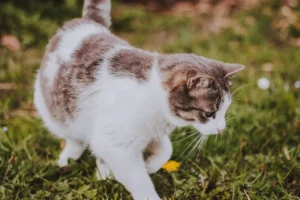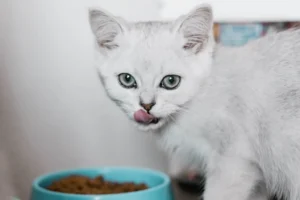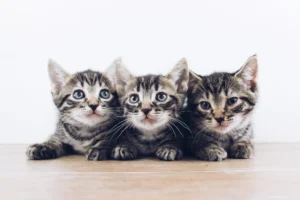Cats have a reputation for being demanding pets, often requiring attention and care on their own terms. But why exactly are cats so demanding? Let’s take a closer look at the reasons behind their behavior.
Cats are independent creatures by nature, but they also rely on their owners for food, shelter, and companionship. This combination of independence and dependence can lead them to exhibit demanding behavior in various ways. Let’s explore the factors that contribute to their demanding nature.
Instinctual Needs
Cats are demanding creatures driven by their instinctual needs for survival and territory. In the wild, cats are both predators and prey, which makes them naturally cautious and territorial animals. This survival instinct manifests in their behavior at home, where they may demand attention or resources to protect what they perceive as their territory. Providing a safe environment with ample resources can help satisfy their instinctual needs and reduce some of their demanding behaviors.
Communication Style
Cats communicate their needs and desires to their owners in subtle and sometimes demanding ways. From meowing incessantly for food to pawing at your leg for attention, cats have various ways of getting their message across. Understanding your cat’s unique communication style is key to meeting their needs effectively. Pay attention to their body language, vocalizations, and behavior to decipher what they are trying to tell you. Remember, meeting their demands is not just about giving in to their requests but also about understanding and addressing their underlying needs.
Routine and Structure
Cats are creatures of habit who thrive on routine and structure. They feel most secure when their environment follows a predictable pattern. This need for consistency extends to their interactions with their owners. Cats can be demanding because they expect their feeding times, play sessions, and cuddle moments to occur at the same time every day. Any deviation from their established routine can leave them feeling anxious or unsettled, leading to demanding behavior as they try to regain a sense of control.
Socialization Factors
Early socialization experiences play a significant role in shaping a cat’s behavior and level of demand for attention. Cats that were properly socialized as kittens tend to be more confident and less demanding of constant reassurance from their owners. On the other hand, cats with limited socialization may develop insecurities that manifest as demanding behavior, such as incessant meowing, attention-seeking antics, or destructive tendencies. It’s essential to provide a secure and nurturing environment for cats from a young age to help prevent excessive demanding behavior in the future.
Additional Insight:
– Early exposure to various people, environments, and stimuli during a cat’s critical socialization period (3 to 9 weeks of age) can significantly influence their personality and level of neediness. Cats that have positive early socialization experiences are more likely to grow into well-adjusted, less demanding pets who are comfortable with various situations and people.
Environmental Enrichment
Cats can be demanding creatures, often seeking stimulation and engagement in their environment. Providing an enriched environment is crucial to keeping them content and preventing excessive demands for attention. To enrich your cat’s surroundings, consider providing them with interactive toys, scratching posts, vertical space for climbing, and access to windows for bird-watching. Creating feeding puzzles or hiding treats around the house can also help keep their minds active. Remember, a stimulated cat is a happier and less demanding cat.
Attention-Seeking Behaviors
When your cat acts demanding, it may be exhibiting attention-seeking behaviors. Common behaviors include meowing excessively, pawing at you, or knocking things off surfaces. Instead of reinforcing these behaviors by immediately giving in to your cat’s demands, try ignoring them when they are being pushy and rewarding them with attention when they are calm. Provide them with regular playtime and positive reinforcement for good behavior to help diminish attention-seeking tendencies. Remember, consistency is key in establishing boundaries and fostering healthier interactions with your feline friend.
Tips for Addressing Attention-Seeking Behaviors:
- Designate specific playtime each day to engage your cat in interactive activities.
- Use positive reinforcement, such as treats or praise, to encourage desirable behavior.
- Provide vertical spaces for climbing and hiding spots for mental stimulation.
- Establish a routine for feeding and play to create predictability for your cat.
- Consult with a veterinarian or animal behaviorist if attention-seeking behaviors persist despite your efforts.
Training and Boundaries
Training your cat and setting clear boundaries are essential in managing their demanding behavior effectively. Remember, cats are incredibly intelligent animals and can learn rules and behaviors just like dogs. Consistency is key when training your cat – establish routines and stick to them. Use positive reinforcement techniques such as treats and praise to encourage good behavior. Additionally, provide plenty of mental stimulation through interactive toys and playtime to help burn off excess energy. By setting boundaries early on and being consistent in your training efforts, you can help curb your cat’s demanding behavior and create a harmonious living environment for both of you.
Health Considerations
When it comes to understanding why cats can be so demanding, it’s crucial to consider their health. Sometimes, underlying health issues can manifest as demanding behavior in cats. If your cat is suddenly acting more demanding than usual, it might be a sign that something is wrong. Regular veterinary check-ups are vital to ensure your cat’s health is in top shape. Remember, cats are masters at hiding signs of illness, so it’s essential to stay vigilant and address any health concerns promptly. By keeping an eye on your cat’s health and seeking medical attention when needed, you can help prevent demanding behavior that may be linked to underlying health issues.
- Provide a balanced diet to support overall health and well-being.
- Keep your cat’s environment clean and enriching to reduce stress and promote good behavior.
- Regularly groom your cat to maintain their physical health and bond with them.
- Ensure your cat has access to fresh water at all times to prevent dehydration and promote good health.
- Consider providing your cat with a scratching post to help them satisfy their natural instinct to scratch.
Interesting Cat Trivia
Did you know that cats have a unique grooming behavior called ‘allogrooming,’ where they groom each other to strengthen social bonds? This fascinating behavior helps cats build trust and camaraderie within their group or with their human companions. So next time you see your feline friend grooming another cat or even yourself, know that it’s their way of showing love and affection.
In addition to their grooming habits, cats also have a strong sense of smell, with scent glands located on their cheeks, paws, and tail. These scent glands release pheromones that help cats mark their territory and communicate with other felines. That’s why your cat might rub against furniture or you – they’re claiming you as part of their territory!
Another interesting fact about cats is that they have a unique hunting strategy known as ‘chatter hunting.’ This behavior involves making a rapid chattering sound with their teeth while observing potential prey, such as birds or squirrels. It’s believed that this noise mimics the sound of bird calls, confusing their prey and giving cats a better chance of catching their meal.
So, the next time your cat demands attention or acts a little too demanding, remember that their behaviors are rooted in their instincts and natural behaviors. Understanding these quirks can help you build a stronger bond with your feline friend and appreciate their unique characteristics even more.
Alex, a passionate animal lover, has experience in training and understanding animal behavior. As a proud pet parent to two dogs and three cats, he founded AnimalReport.net to share insights from animal experts and expand his knowledge of the animal kingdom.









